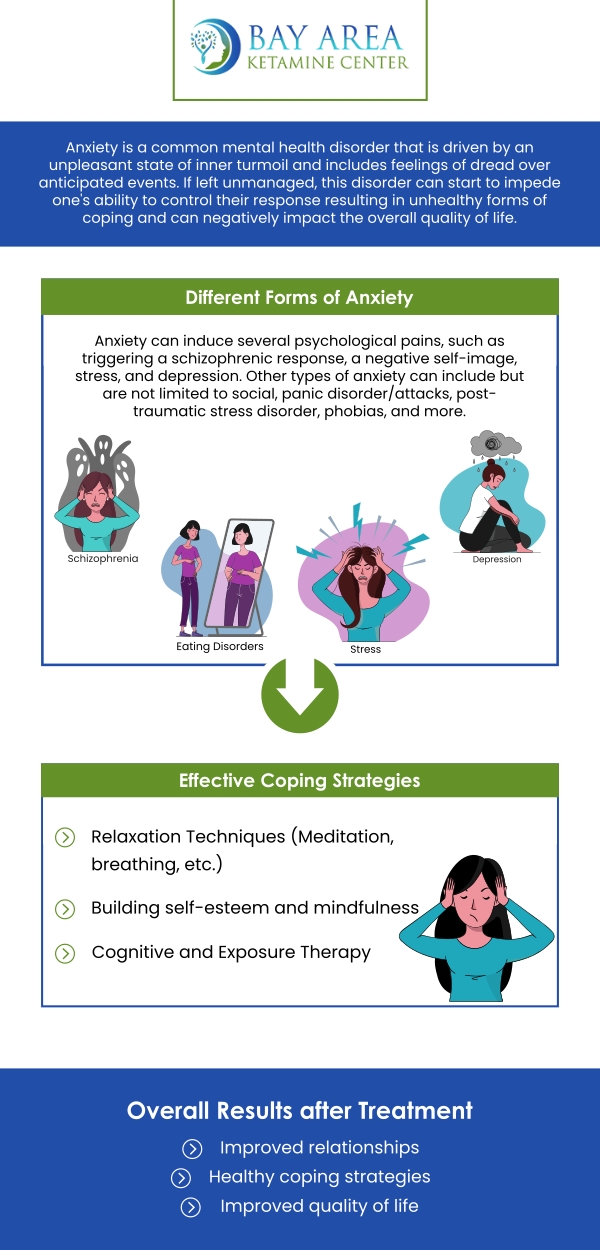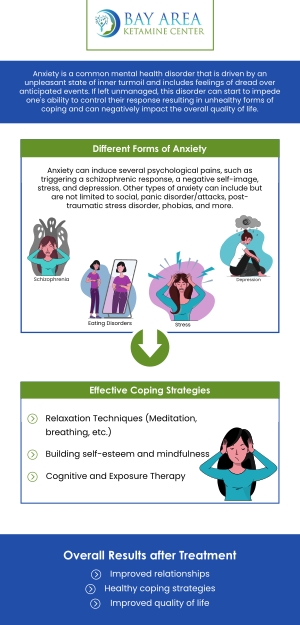Who Are at Risk of Developing Anxiety?
Anxiety disorder can be defined by feelings of worry, dread, and unease in response to stress. Anxiety symptoms vary from person to person; some frequent symptoms include anxiousness, panic, and fear, along with sweating and a rapid heartbeat. Visit the Bay Area Ketamine Center to get specialized and comprehensive treatment for anxiety. For more information, contact us today or schedule an appointment online. Our clinic is conveniently located at 746 Altos Oaks Drive Suite B, Los Altos, CA 94024.




Table of Contents:
What are the common symptoms of anxiety?
Who is at risk of developing anxiety?
What are the short-term and long-term coping strategies for anxiety?
What are the worst triggers of anxiety?
Anxiety is one of the most common mental health disorders and is often associated with other underlying conditions, both physical and mental health-related. While some anxiety disorders will be best treated through medication, the vast majority of anxiety symptoms can be properly managed through the support and guidance of a therapist. Seeking out therapy for anxiety will provide patients with an array of coping strategies, allowing them to identify possible triggers and learn how to healthily cope with the trigger at the moment, making existing daily much easier.
There are several different types of anxiety disorders, all with similar symptoms that vary in severity depending on the disorder. Common symptoms of anxiety include:
• Feelings of panic, or impending doom or danger
• Restlessness, nervousness, or feeling tense in particular situations or in general
• Increased sweating, heart rate, and rapid breathing
• Difficulty focusing on anything other than the trigger for the symptoms
• Difficulty controlling the feelings of worry
• Insomnia
• Increased weakness and fatigue
It is common for those who suffer from anxiety to let their worries start to impact their daily life, determining the activities in which they may participate or causing them to be distracted while performing normal daily tasks. When left unaddressed, these symptoms can continue to worsen until the patient has determined a healthy and effective means of coping with anxiety.
There is no clear cause for anxiety, with many people who develop an anxiety disorder often either having a genetic predisposition for the disorder, having an aspect of their personality that puts them at an increased risk of developing anxiety or undergoing a traumatic event. It seems likely that a traumatic event will often lead to an anxiety disorder in those who already have a predisposition for the disorder, with those who have a relative who has anxiety more likely to develop the same disorder. Some medical conditions can increase the risk of developing anxiety, including chronic pain, heart conditions, and respiratory disorders, to name a few. There are quite a few factors that can increase the risk of developing an anxiety disorder, such as:
• Trauma
• Stress (likely built up or due to an underlying health condition)
• Substance use or abuse
• Other mental health disorders (it is common to have more than one mental health disorder, and depression is a commonly linked mental health disorder with anxiety)
If you suffer from an anxiety disorder, meeting with a therapist or counselor will help to provide you with a variety of coping strategies to help manage the disorder, both for achieving immediate results as well as long-term results. Commonly recommended short-term coping strategies for an anxiety disorder include mindful breathing, grounding techniques, exercise, and addressing your thought pattern. A therapist can guide you through these different coping strategies to help determine which approach will be the most beneficial for your symptoms. Longer-term coping strategies will likely be less effective in managing levels of anxiety at the moment. Still, they can offer long-lasting results including cognitive behavioral therapy to help you treat the anxiety at its source, identifying and managing triggers, meditation, prescription medication, maintaining an active and healthy lifestyle through a balanced diet and regular exercise, managing a healthy social life, and journaling. Many of these coping strategies such as ketamine therapy can be used in tandem to provide more effective results, allowing you to properly manage your anxiety disorder to allow you to live more comfortably and confidently.
There are quite a few common daily factors or triggers that can worsen symptoms of anxiety or can make an anxiety disorder more difficult to manage, including stress, self-neglect, unhealthy relationships, and caffeine. If the anxiety seems to be triggered by increased stress, it will only continue to worsen and make it that much more difficult to complete daily tasks promptly as the symptoms continue to go unmanaged. Many triggers for anxiety cannot be avoided, making developing healthy coping mechanisms and the ability to determine possible triggers to be able to recognize what in the situation is inducing increased anxiety is vital in managing symptoms daily.
If anxiety disorder is making your life difficult every day and you want to combat it, visit us at Bay Area Ketamine Center, and we will help you. For more information, contact us or schedule an appointment online. Our clinic is conveniently located at 746 Altos Oaks Drive Suite B, Los Altos, CA 94024. We serve patients from Los Altos CA, Sunnyvale CA, Palo Alto CA, Stanford CA, Atherton CA, Cupertino CA, Santa Clara CA, Mountain View CA, Loyola CA, and surrounding areas.

Check Out Our 5 Star Reviews







